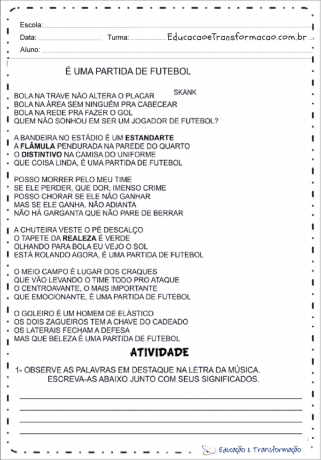
We selected in this post several World Cup Text Interpretation Activities, ready to copy and print and work in the classroom or homework. These are suggestions for educational activities about football.
Every four years, soccer teams from different countries around the world gather to compete in the Soccer World Cup.
The competition was created by Frenchman Jules Rimet, in 1928, after having assumed the command of the most important institution in world football: FIFA (Federation International Football Association).
THE 2018 FIFA World Cup or 2018 FIFA World Cup will be the twenty-first edition of this sporting event, an international men's soccer tournament organized by the International Football Federation (FIFA), which will take place in Russia, host of the competition for first time. With eleven host cities, the championship will be played between June 14th and July 15th.
See also at:
In schools across the country, teachers, especially in the early grades
Index


Ball on crossbar does not change score
Ball in the area with no one to head
Ball in the net to score the goal
Who never dreamed of being a soccer player?
The flag in the stadium is a banner
The pennant hanging on the bedroom wall
The badge on the uniform shirt
What a beautiful thing a football match is
I can die for my team
If he loses, what a pain, huge crime
I can cry if he doesn't win
But if he wins, it's no use
There's no throat that doesn't stop screaming
The boot wears the bare foot
The royal rug is green
looking at the ball i see the sun
It's happening now it's a football match
The midfield is the place for the stars
Who are taking the whole team to the attack
The center forward, the most important
How exciting, it's a football match
My goalkeeper is a man with elastic
The two defenders have the key to the lock
The full-backs close the defense
But what a beauty a football match is!
Ball on crossbar does not change score
Ball in the area with no one to head
Ball in the net to score the goal
Who never dreamed of being a soccer player?
The midfield is the place for the stars
Who are taking the whole team to the attack
The center forward, the most important
How exciting a football match is!
Utêrêrêrê, utêrêrêrê, utêrêrêrê, utêrêrêrê.
Samuel Rosa / Nando Reis.
01 – “I can die for my team”. What is the meaning of the words “to die” and “Crime” in the context of the song?
— Dying: of joy or sadness.
— Crime: is losing the game.
02 – Why is defeat considered a crime by the poetic self?
Because for the poetic self, only victory matters.
03 – “There is no throat that does not stop screaming”. Why won't the poetic self stop screaming?
Because the emotion is the joy of seeing your team win. It's the explosion of happiness.
04 – What kind of people are the lyrics of the song referring to when it says that the foot would be bare before putting on the boot.
It refers to the feet of players, teams.
05 – The royal carpet is green says the song. Who is royalty? Because?
Royalty is the stadium. Because that's where the football match will take place.
06 – The poetic self sees the sun on the football field, why?
Because, the ball is round and has the same shape as the sun.
07 – Why, according to the text, is the midfield a place for aces?
Because the midfield is composed of attacking players, those who are responsible for scoring the goal(s) and giving the team victory.
08 – According to the song, the goalkeeper is a man with an elastic band, why?
Because he has to do the impossible to save the goal, jumping, jumping, and not letting the ball pass.
09 – What do defenders have the lock? Why do they have the key?
In football, defenders have an obligation not to let the ball pass towards their goal. That's why he is said to have the key to the lock.
10 – “What is the problem of not having anyone in the area to head? Head what? In which direction?”
If there is no opposing player in the area, he will not have a chance to score. Heading the ball. Towards the goal.
11 – “I can cry if he doesn't win, but if he wins,” the highlighted word, is opposing two ideas in this excerpt of the text. What are these ideas? Why are they opposite?
The ideas are that I may or may not cry if he wins.
When we use the conjunction “but”, it is adversative, that is, it expresses the idea of contrast or compensation.
12 – What do you consider exciting in a football match?
Student's personal response.
13 – The song asks the following question: “Who didn't dream of being a football player?” Have you ever dreamed of being a player? Because?
Student's personal response.


The ball
The father gave his son a ball. Remembering the pleasure he had felt in getting his first ball from his father. A number 5 with no official leather goal. It wasn't leather anymore, it was plastic. But it was a ball.
The boy thanked him, unwrapped the ball and said “cool! “. Or what boys say these days when they like the present or don't want to hurt the old man. Then he started to spin the ball, looking for something.
– How do you call?-He asked.
– How, how do you call? It doesn't.
The boy searched inside the wrapping paper.
– She doesn't have any instructions?
The father began to get discouraged and to think that times have changed. That times are decidedly different.
– No need for instruction manual.
– What does she do?
– She doesn't do anything. You do things with her.
- What?
– Control, kick…
– Oh, so it's a ball?
– Of course it's a ball.
– One ball, ball. A ball even.
– You thought it was what?
- Nothing no.
The little boy thanked him, said “Cool! “again, and after a while his father found him in front of the TV, with the new ball at his side, handling the controls of a video game. Something called MONSTER BALL, in which teams of little monsters competed for possession of a ball in the form of an electronic blip on the screen while trying to destroy each other. The boy was good at the game. He had coordination and quick thinking. I was winning the machine.
The father took the new ball and practiced some embaixadas. He managed to balance the ball on his instep, as before, and called the boy.
– Son, look.
The boy said “nice” but didn't take his eyes off the screen. The father held the ball in his hands and sniffed it, mentally trying to recover the smell of the leather. The ball smelled like nothing. Maybe an instruction manual would be a good idea, she thought. But in English, for the kids to be interested.
1) The first paragraph of the text compares the father's first ball, which he received as a childhood gift, with the ball he bought for his son. What are the main differences between these two objects?
2) What would have led the boy to ask questions such as “How do you care?”, “Is there no instruction manual?” or "What does she do?" Did toys a few years ago raise this kind of question?
3) Note the following fragment of the text: "The boy thanked, said 'Cool' again, and after a while his father found him in front of the TV, with the new ball at his side, wielding the controls of a video game". Did the boy's reaction to receiving the gift show excitement? Because?
4) Imagine a possible reaction if the boy had, in fact, really enjoyed the gift.
5) Do you know what the expressions “Monster ball” and “blip” mean?
6) In the third-to-last paragraph of the text, the father makes another attempt to capture the child's attention. What did he do? Has he been successful? What phrase in the text shows the boy's reaction?
7) Note the following sentence in the text: “- How does it connect? - He asked. " Why did the author use the dash in this and other parts of the text?
8) At what point did the author use (“)? Because?
9) Why in the fragment “Controla, chuta…” did the author use ellipses?
10) Is the text narrated in 1st or 3rd person? Justify:
11) The text “A Bola” is a narrative text. Because?
12) Regarding the plot, answer:
a) What is the initial status of the text?
b) What is the complication?
c) What is the dynamics of the characters' actions?
d) What is the resolution found?
e) What is the final solution?
13) What is the environment, that is, the space where the story takes place? Justify with excerpts from the text.

I WANT TO PLAY TOO!
Because there were two brothers: a boy, the
Peter. And a girl, Joana.
They lived with their parents, Mr Setúbal and Dona Brites.
And the problems they had were no different from all the brothers' problems.
For example…
Pedro took the ball to go play soccer,
there came Joana:
– I want to play too!
Peter danced:
– Where have you ever seen women play football?
– Hey, I see it all the time! There's even a TV artists game! And even if I didn't see… One
time is the first!
- I'm not taking you! What will my friends say?
– And I'm calling what your friends are going to say?
– I am. I don't take it and that's it!
Joana was furious, slammed the doors, kicked whatever she found on the floor, made a face.
Miss Brites was angry:
– What is it, girl? What behavior! Girl has to be delicate, good...
- Good girl? Well yes! – Joana replied in a bad manner.
Ruth Rocha
1) The problem that gives rise to this story is: (0.1)
( ) Same-sex siblings who have relationship problems.
( ) Mother and child do not have a good relationship.
( ) Siblings of different sexes who have relationship problems.
2) The text shows a type of prejudice that is common between boys and girls. What kind of prejudice is this? (0,2)
3) In the excerpt
“I want to play too!
Pedro danced: Pedro danced:
_ Where have women ever seen playing soccer?”
The highlighted expression means: (0.1)
( ) didn't care
( ) got angry
( ) screamed louder
4) The theme of the text is: (0.2)
( ) Prejudice between girls and boys.
( ) The daily fight between two brothers.
( ) The parents' lack of patience.
5) In the excerpt "They lived with their parents, Mr Setúbal and Mrs Brites." Which characters in the text can the highlighted word be replaced? (0,1)
6) Read the sentence below again.
- Good girl? Well yes! – Joana replied in a bad manner.
• In this sentence, the word modes means: (0.2)
( ) Position of the body.
( ) A way to say.
( ) Way to get something.
7) This text was written to: (0,2)
( ) Teach sibling games.
( ) Warn about prejudice.
( ) Criticizing the exaggerated affection between parents and children.
8) What reaction Joan had when her brother didn't take her to play ball? (0,2)
9) What reason did João have for not taking his sister to the soccer game? (0,2)
10) In this text, the narrator is: (0.2)
( ) Joana
( ) your Setubal
( ) Peter
( ) to Ruth Rocha
( ) Mrs Brites
11) Check the adjectives that refer to Joan: (0.2)
( ) delicate
( ) stubborn
( ) questioner
( ) quiet





the great-great-grandfather of football
It was the Chinese who invented football some 4,500 years ago. Although what they played at that time was a kind of great-great-grandfather of modern football. It wasn't even considered a sport, just a training for soldiers. The ancient Chinese named their game Kerami. Each team had eight players and the goals were made with bamboo poles stuck in the ground. The thing was to kick the ball past the stakes and score points. Nobody wanted to know about defending, just attacking.
Football continued for a long time as training for soldiers. It was like that in Ancient Greece and also in Rome. Greek players kicked the ball made with an ox bladder filled with sand. Poor things, your feet must have been hurting a lot after the matches. Since they were soldiers, they shouldn't care too much about that.
It was only in the 17th century that the British managed to take football away from the military, turning it into a sport. The field then measured 120 meters wide by 180 meters long. At each of its ends there were two wooden posts called goal (the word goal comes from the English goal). The ball was already air-filled leather. But it was a game played only by the rich, the nobles.
Over time, it came to be practiced by boarding school students. And it was the biggest mess; each school had its own rules and therefore it was not possible to schedule matches between them. The way was to organize the thing. In the city of Cambridge, students from various schools held a meeting to establish a single code of rules that would fit everyone. Thus was born modern football.
Folha de São Paulo – Leaflet
Mark (X) in the correct answer:
a) When and where did football appear?
( ) In Rome in the year 4,500.
( ) In China there are about 4,500.
( ) In the 17th century, in England.
( ) In Kerami for about 4,500 years.
b) What was the name of the game and what was its purpose?
( ) Kerami. It was just training for soldiers.
( ) Kerami. It was a game played only by the rich, the nobles.
( ) Kerami. The Chinese Who Invented Football
( ) None of the above alternatives.
c) Where and when did it become a sport?
d) What innovations have the British added to the sport?
e) What is the purpose of creating the rules?
( ) To be considered a sport, but only training for soldiers.
( ) Because it is a game played only by the rich, the nobles.
( ) Each school had its own rules and therefore it was not possible to schedule matches between them.
( ) The thing was to kick the ball past the stakes and score points. Nobody wanted to know about defending, just attacking.
f) Number the sentences in the order they appear in the text:
( ) The ball was made with an ox bladder filled with sand.
( ) Students held a meeting to establish a single code.
( ) Football emerged as a training for soldiers.
( ) The Chinese can be considered the great grandparents of football.
Underline the subject of the sentences:
a) A female fell from the branches of a tree and died instantly.
b) The player is injured.
c) The monkey ate all the bananas.
d) The teacher taught subject and predicate.
e) The Earth revolves around the Sun.
f) Farmers prepare the land.
Complete the sentences with a suitable subject:
a) _____________ fell from the coconut tree.
b) ________________barked all night!
c) ________________ is a devoted mother.
d) __________________went to the circus.
e) _________________knows all the material of the test.
Underline the predicate of the sentences:
a) Children are abandoned.
b) The dog is man's friend.
c) My cousins are living far from the city.
d) The sun was very strong.
e) Raul is very fond of ice cream.
f) Rafaela, Manuela and Roberta are waiting for the nurse.
Separate the subject from the predicate:
a) Marcos is a very polite student.
Subject __________________________
Predicate _____________________
b) The king had the palace painted.
Subject _________________________
Predicate _________________________
c) Eduardo celebrated his birthday at the beach house.
Subject _________________________
Predicate _____________________
d) We had lunch at the restaurant.
Subject __________________________
Predicate _______________________
e) My dog is sick.
Subject _____________________________
Predicate __________________________
f) The game is tied.
Subject _____________________
Predicate _____________________
Complete the sentences with a predicate:
a) The goalkeeper __________________.
b) The _____________________ computer.
c) The poor girl _______________________.
of the road ___________________________.
e) My colleague __________________________.
f) The __________________________ animal.
What did you think of the post "World Cup Text Interpretation Activities"? If you liked, be sure to share it with your friends on social networks.
Subscribe to our email list and receive interesting information and updates in your email inbox
Thanks for signing up.


